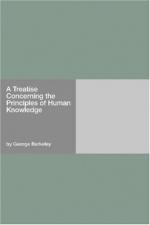106. Caution as to the use of analogies.—But we should proceed warily in such things, for we are apt to lay too great stress on analogies, and, to the prejudice of truth, humour that eagerness of the mind whereby it is carried to extend its knowledge into general theorems. For example, in the business of gravitation or mutual attraction, because it appears in many instances, some are straightway for pronouncing it universal; and that to attract and be attracted by every other body is an essential quality inherent in all bodies whatsoever. Whereas it is evident the fixed stars have no such tendency towards each other; and, so far is that gravitation from being essential to bodies that in some instances a quite contrary principle seems to show itself; as in the perpendicular growth of plants, and the elasticity of the air. There is nothing necessary or essential in the case, but it depends entirely on the will of the Governing Spirit, who causes certain bodies to cleave together or tend towards each other according to various laws, whilst He keeps others at a fixed distance; and to some He gives a quite contrary tendency to fly asunder just as He sees convenient.
107. After what has been premised, I think we may lay down the following conclusions. First, it is plain philosophers amuse themselves in vain, when they inquire for any natural efficient cause, distinct from a mind or spirit. Secondly, considering the whole creation is the workmanship of a wise and good Agent, it should seem to become philosophers to employ their thoughts (contrary to what some hold) about the final causes of things; and I confess I see no reason why pointing out the various ends to which natural things are adapted, and for which they were originally with unspeakable wisdom contrived, should not be thought one good way of accounting for them, and altogether worthy a philosopher. Thirdly, from what has been premised no reason can be drawn why the history of nature should not still be studied, and observations and experiments made, which, that they are of use to mankind, and enable us to draw any general conclusions, is not the result of any immutable habitudes or relations between things themselves, but only of God’s goodness and kindness to men in the administration of the world. See sect. 30 and 31 Fourthly, by a diligent observation of the phenomena within our view, we may discover the general laws of nature, and from them deduce the other phenomena; I do not say demonstrate, for all deductions of that kind depend on a supposition that the Author of nature always operates uniformly, and in a constant observance of those rules we take for principles: which we cannot evidently know.




